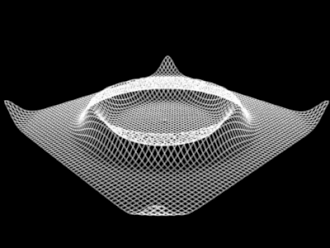Animation
Derived from the Latin word for "soul", animation is a way of making a movie from many still images. For example, Mickey Mouse was an animator. The images are put together one after another, and then played at a fast speed to give the illusion of movement.

Animation is a relatively new art form, and though the idea of moving images has been a theme throughout ancient civilizations, it was not until late into the 19th century that experimental animation truly began. Today, the industry of animation is booming, making up a huge commercial enterprise.
A person who makes animations is called an animator.
There are three ways to animate:
- Draw each frame
- Use stop-motion: make a model scene and change it to create a new image (frame)
- Make computer graphics
Overview
Because it is expensive to make, most animation comes from professional companies. However, independent animators have existed since the 1950s in America, with many of those people entering the professional industry. In Europe, the independent moments has existed since the 1910s, with animators like pre-revolutionary Russia's Ladislas Starevich and Germany's Lotte Reiniger.
Many people use a computer animation program called Adobe Flash to create animations. Flash uses a combination of drawing and computer graphics to make animations. Many animations on the internet are made in Flash. Most animators on the internet do not work for professional companies.
Many television shows, especially those made for children, use limited animation. Companies such as UPA and Hanna-Barbera Productions do this. Simple, limited movement makes the images easier to draw, which allows faster and cheaper production of animation.
Famous names in the business
- Tex Avery
- Ralph Bakshi
- Joseph Barbera
- Brad Bird
- Seth McFarlane
- Don Bluth
- Sylvain Chomet
- Gabor Csupo
- Stephen Hillenburg
- Gene Deitch
- Walt Disney
- Adam Elliot
- Max Fleischer
- Friz Freleng
- Matt Groening
- Yoram Gross
- William Hanna
- Ray Harryhausen
- Ub Iwerks
- Henry Selick
- Chuck Jones
- Mike Judge
- Glen Keane
- Arlene Klasky
- Walter Lantz
- John Lasseter
- Winsor McCay
- Norman McLaren
- Hayao Miyazaki
- Yuriy Norshteyn
- Katsuhiro Otomo
- Nick Park
- Trey Parker
- Bill Plympton
- Matt Stone
- Will Vinton
- Bob Clampett
- Richard Williams
Famous animation studios
United States
- DePatie-Freleng Enterprises
- DreamWorks SKG
- Nickelodeon Movies
- Film Roman
- Filmation
- Hanna-Barbera (now Cartoon Network Studios)
- Sony Pictures Animation
- Klasky Csupo
- MGM
- Reel FX Creative Studios
- Laika (company)
- Pixar
- Blue Sky Studios
- Illumination Entertainment
- UPA
- Walt Disney Pictures
- Warner Bros.
- Warner Animation Group
Canada
- Atkinson Film-Arts
- Cinar (now Cookie Jar Entertainment)
- CinéGroupe
- National Film Board of Canada
- Nelvana
Europe
- Aardman Animations (United Kingdom)
- Arsyn Video Interactive (France)
- Belvision (Belgium)
- Centre for Animated Films Cacak (Serbia)
- Chromosomos (Spain)
- Cosgrove Hall Films (United Kingdom)
- CreaSyn Studio (France)
- DIC (France)
- Ellipse Programme (France)
- France Animation (France)
- Grand Slamm Children's Films (United Kingdom)
- kaViArt (France)
- MacGuff (France)
- Pannónia Filmstúdió (Hungary)
- Red 3ye Productions (France)
- Soyuzmultfilm (Russia)
- Sullivan Bluth Studios (Ireland)
- Synthĕsis Animation Studio (France)
- Zagreb Film (Croatia)
Japan
- Bandai Visual
- BONES
- GAINAX
- Gonzo
- Kyoto Animation
- Madhouse Studios
- Production I.G.
- Pierrot
- Studio Ghibli
- Sunrise
- Tatsunoko Productions
- Toei
China
- Beijing Xie Art (mainland)
- Colorland (Hong Kong)
- Wang Film Productions (Taiwan)
Philippines
Australia
- DisneyToon Studios
- Liquid Animation
- Yoram Gross Films / Flying Bark Productions
Related pages
- Anime
- Cartoon
- CGI animation
- Movie
- Stop-Motion
- CGI ImageMovers And PlayTone
